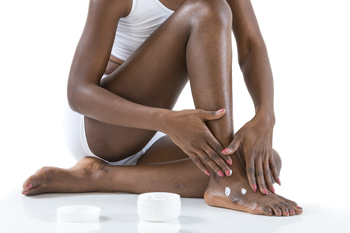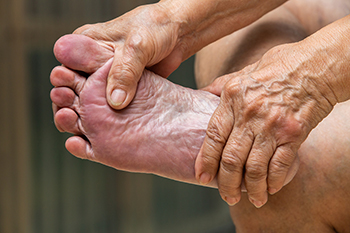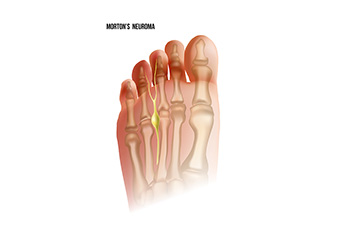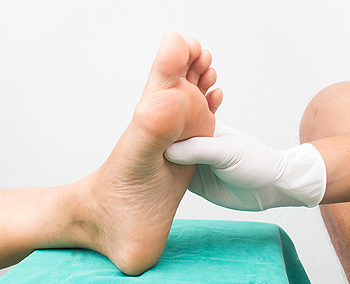Items filtered by date: June 2023
Tips for Having More Attractive Feet

Professional pedicures are an obvious step to take if you want to have more attractive feet, but sometimes this is not possible. There are routines that can be done at home that an individual can follow to help to ensure their feet are healthy and looking nice Following these steps for everyday foot care can save you time and money. This can begin with soaking the feet. Adding Epsom salts to warm water can cleanse the feet, soften them, and make the toenails easier to trim. After drying the feet, a foot file or large nail file can be used to file corns or calluses. This can be done gently until the skin feels smoother. Next, the feet can be exfoliated with an appropriate scrub that can remove dead skin cells and soften dry skin. It is important to trim the toenails straight across and smooth the edges with a nail file. This can be followed by moisturizing the feet and completed by polishing your toenails. In performing this process, if you encounter any wounds on your feet or areas of infection, it is suggested to see a podiatrist who can examine your feet and tend to any problem areas.
Everyday foot care is very important to prevent infection and other foot ailments. If you need your feet checked, contact Dr. Douglas Mckay from New Jersey . Our doctor can provide the care you need to keep you pain-free and on your feet.
Everyday Foot Care
Often, people take care of their bodies, face and hair more so than they do for their feet. But the feet are a very important aspect of our bodies, and one that we should pay more attention to. Without our feet, we would not be able to perform most daily tasks.
It is best to check your feet regularly to make sure there are no new bruises or cuts that you may not have noticed before. For dry feet, moisturizer can easily be a remedy and can be applied as often as necessary to the affected areas. Wearing shoes that fit well can also help you maintain good foot health, as well as making it easier to walk and do daily activities without the stress or pain of ill-fitting shoes, high heels, or even flip flops. Wearing clean socks with closed shoes is important to ensure that sweat and bacteria do not accumulate within the shoe. Clean socks help to prevent Athlete’s foot, fungi problems, bad odors, and can absorb sweat.
If you have any questions please feel free to contact one of our offices located in Caldwell, and Galloway, NJ . We offer the newest diagnostic and treatment technologies for all your foot and ankle needs.
How Aging Can Affect Your Feet

Anyone in their senior years is no stranger to pain, but changes in the feet are often ignored. One of the ways the feet can change with aging is a loss of natural cushioning, particularly in the heel pads. At the same time, as the skin in the feet gets thinner and loses elasticity, the risk of foot injuries increases. A common injury is plantar fasciitis, which is the direct result of loss of elasticity that can cause the arch to collapse. This places more pressure on the feet to absorb shock and weight, producing foot pain. Such an occurrence, in turn, can negatively affect the legs, knees, hips, and back. Conditions such as arthritis, diabetes, and obesity are other causes of foot pain as a person ages. Becoming more sedentary only adds to the risk of pain in the feet. Experts believe that light stretching and strength exercises are a good way to stave off foot pain. Wearing more supportive shoes that have ample cushioning can make a difference. And in some cases, investing in a pair of custom orthotics, or shoe inserts, is a solution. For more information about dealing with foot pain as you age, it is suggested that you seek the counsel of a podiatrist.
Proper foot care is something many older adults forget to consider. If you have any concerns about your feet and ankles, contact Dr. Douglas Mckay from New Jersey . Our doctor can provide the care you need to keep you pain-free and on your feet.
The Elderly and Their Feet
As we age we start to notice many changes in our body, but the elder population may not notice them right away. Medical conditions may prevent the elderly to take notice of their foot health right away. Poor vision is a lead contributor to not taking action for the elderly.
Common Conditions
- Neuropathy – can reduce feeling in the feet and can hide many life-threatening medical conditions.
- Reduced flexibility – prevents the ability of proper toenail trimming, and foot cleaning. If left untreated, it may lead to further medical issues.
- Foot sores – amongst the older population can be serious before they are discovered. Some of the problematic conditions they may face are:
- Gouging toenails affecting nearby toe
- Shoes that don’t fit properly
- Pressure sores
- Loss of circulation in legs & feet
- Edema & swelling of feet and ankles
Susceptible Infections
Diabetes and poor circulation can cause general loss of sensitivity over the years, turning a simple cut into a serious issue.
If you have any questions please feel free to contact one of our offices located in Caldwell, and Galloway, NJ . We offer the newest diagnostic and treatment technologies for all your foot and ankle needs.
Symptoms of Morton’s Neuroma

The nerve found between the third and fourth toes can be affected by a foot condition known as Morton’s neuroma. This is an ailment that compresses or irritates the nerve and is considered to be benign. The majority of patients who develop Morton’s neuroma have severe pain and discomfort, and it can be difficult to walk. Morton's neuroma may be common in women who frequently wear high heels. These types of shoes have limited room in the toe area and this can cause the toes to shift toward each other, affecting the nerve. The pain is often felt in the ball of the foot and can be noticed while standing and walking. Additionally, a burning or tingling sensation can affect the toes, and it may feel like there is a small pebble in the shoe or sock. If you have pain in this area of your foot, it is suggested that you seek the counsel of a podiatrist who can perform a diagnosis and offer the proper treatment options.
Morton’s neuroma is a very uncomfortable condition to live with. If you think you have Morton’s neuroma, contact Dr. Douglas Mckay of New Jersey . Our doctor will attend to all of your foot care needs and answer any of your related questions.
Morton’s Neuroma
Morton's neuroma is a painful foot condition that commonly affects the areas between the second and third or third and fourth toe, although other areas of the foot are also susceptible. Morton’s neuroma is caused by an inflamed nerve in the foot that is being squeezed and aggravated by surrounding bones.
What Increases the Chances of Having Morton’s Neuroma?
- Ill-fitting high heels or shoes that add pressure to the toe or foot
- Jogging, running or any sport that involves constant impact to the foot
- Flat feet, bunions, and any other foot deformities
Morton’s neuroma is a very treatable condition. Orthotics and shoe inserts can often be used to alleviate the pain on the forefront of the feet. In more severe cases, corticosteroids can also be prescribed. In order to figure out the best treatment for your neuroma, it’s recommended to seek the care of a podiatrist who can diagnose your condition and provide different treatment options.
If you have any questions, please feel free to contact one of our offices located in Caldwell, and Galloway, NJ . We offer the newest diagnostic and treatment technologies for all your foot care needs.
Causes of Peripheral Neuropathy

The body is full of nerves whose main job is to let us touch and feel, as well as to warn us of dangerous conditions. The peripheral nervous system contains nerves in the lower extremities. When these nerves become damaged, they are unable to signal the toes and feet when something goes wrong. This condition is known as peripheral neuropathy. Symptoms of peripheral neuropathy are numbness, pain, and weakness. Causes include excessive use of alcohol, certain types of medication, vitamin B12 deficiency, and heredity. Other causes are infections, such as shingles and Lyme disease, as well as tumors and diabetes. Many diabetics develop peripheral neuropathy, which leaves them unable to detect sores and cuts on the feet. If left unattended, a cut or sore may turn into a diabetic foot ulcer that can become gangrenous and endanger the limb itself. Such diabetic neuropathy is the result of maintaining high levels of blood sugar that damage the nerves serving the feet. If you are experiencing any level of neuropathy in the toes, feet, or ankles, it is suggested that you consult a podiatrist as soon as possible.
Neuropathy
Neuropathy can be a potentially serious condition, especially if it is left undiagnosed. If you have any concerns that you may be experiencing nerve loss in your feet, consult with Dr. Douglas Mckay from New Jersey . Our doctor will assess your condition and provide you with quality foot and ankle treatment for neuropathy.
What Is Neuropathy?
Neuropathy is a condition that leads to damage to the nerves in the body. Peripheral neuropathy, or neuropathy that affects your peripheral nervous system, usually occurs in the feet. Neuropathy can be triggered by a number of different causes. Such causes include diabetes, infections, cancers, disorders, and toxic substances.
Symptoms of Neuropathy Include:
- Numbness
- Sensation loss
- Prickling and tingling sensations
- Throbbing, freezing, burning pains
- Muscle weakness
Those with diabetes are at serious risk due to being unable to feel an ulcer on their feet. Diabetics usually also suffer from poor blood circulation. This can lead to the wound not healing, infections occurring, and the limb may have to be amputated.
Treatment
To treat neuropathy in the foot, podiatrists will first diagnose the cause of the neuropathy. Figuring out the underlying cause of the neuropathy will allow the podiatrist to prescribe the best treatment, whether it be caused by diabetes, toxic substance exposure, infection, etc. If the nerve has not died, then it’s possible that sensation may be able to return to the foot.
Pain medication may be issued for pain. Electrical nerve stimulation can be used to stimulate nerves. If the neuropathy is caused from pressure on the nerves, then surgery may be necessary.
If you have any questions, please feel free to contact one of our offices located in Caldwell, and Galloway, NJ . We offer the newest diagnostic and treatment technologies for all your foot care needs.


